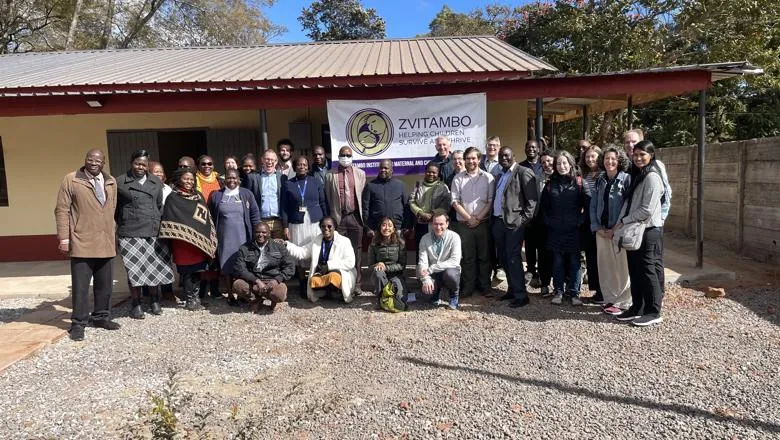Following successful installation—funded by the King’s Infrastructure Fund and the Gates Foundation—we have demonstrated the feasibility of what may be the world’s first solar-powered MRI system. We are now undertaking power and cost modeling to define the minimal, cost-effective setup required to support deployment in low- and middle-income countries."
Dr Niall Bourke, Research Fellow at IoPPN and SHINE Study Investigator
13 May 2025
King's researchers received British Neuroscience Association Green Neuroscience Prize
The prize recognised their contribution to construct the first solar-powered MRI facility in the world.

The British Neuroscience Association's Green Neuroscience Prize 2025 has been awarded to the teams that constructed and fitted the first solar-powered MRI facility in the world.
King's researchers Dr Niall Bourke, Professor Steve Williams and Carly Bennalick are leading the deployment and harmonisation of scanners across more than 20 sites within the UNITY (Ultra-Low Field Neuroimaging in the Young) network.
One recent study joining the network, Sanitation Hygiene Infant Nutrition Efficacy (SHINE), led by Queen Mary, University of London and the Zvitambo Institute for Maternal and Child Health, examines the effects of early-life factors on brain structure and function by following the development of over 1,200 children in rural Zimbabwe.
As part of the study, the teams overcame significant challenges to build appropriate neuroscience infrastructure in resource-limited settings by constructing a green laboratory and installing Zimbabwe's first and only portable MRI system.
The laboratory houses 64-channel electroencephalography (EEG), peripheral quantitative computed tomography (pQCT), electrocardiography (ECG), spirometry, advanced ultrasound, and a dedicated space for anthropometry, sample collection, and neurodevelopmental testing. The team also developed local capacity by training radiographers and nurses to use these innovative technologies in remote rural regions.
Faced with unreliable electricity, the team innovated by powering the facility entirely with solar energy, eliminating dependence on diesel generators and reducing carbon emissions. This sets a global precedent for green neuroscience infrastructure in resource-limited settings. The new building, adjacent to a 5000-gallon water tank, demonstrates the teams' commitment to environmentally conscious practices, enabling off-grid operation while minimising carbon emissions.
The BNA Green Neuroscience Award recognised the remarkable achievement of the SHINE Study team. This initiative created a sustainable research environment, addressing the global challenge of energy equity and climate change. Additionally, it empowers local communities by building research capacity and fostering a sustainable innovation model.
* Full team - Dr Niall Bourke 1,2, Professor Steve Williams 1,2 , Carly Bennalick 1,2, Prof. Sean Deoni 2, Dr Michael Papasavva 3,4. Dr Joseph Piper 3,4, Prof. Andrew Prendergast 3,4, Dr Cynthia Kahari 4, Anabel Mutero 4 & Loyce Musiiwa 4
1 Institute of Psychiatry, Psychology & Neuroscience at King's College London
2 Bill & Melinda Gates Foundation, UNITY Project
3 Queen Mary, University of London
4 Zvitambo Institute for Maternal and Child Health Research
In collaboration with the Zimbabwean Ministry of Health.
